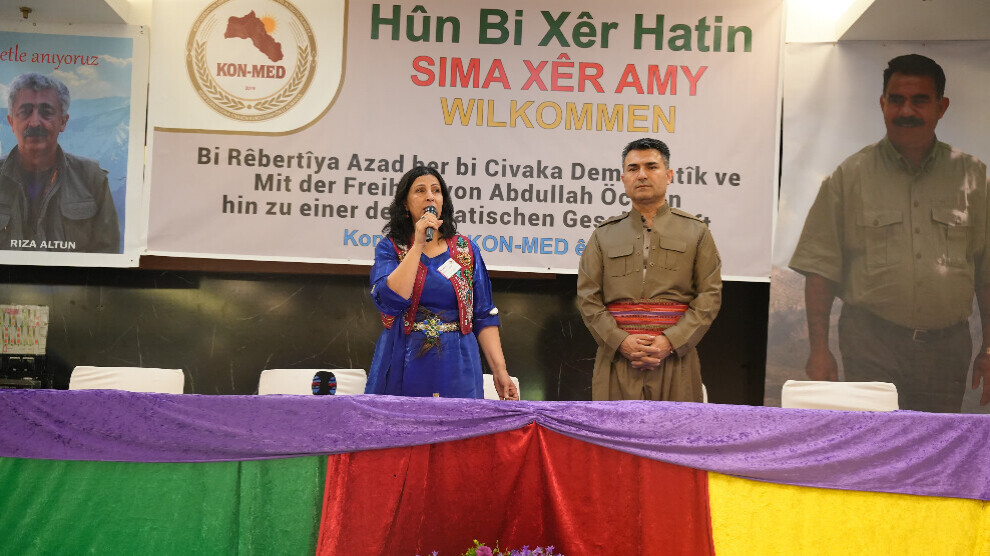KON-MED congress calls for Kurdish language courses in all centers
The 4th Ordinary Congress of KON-MED concluded with a decision to launch Kurdish language courses in all community centers across Germany.
The 4th Ordinary Congress of KON-MED concluded with a decision to launch Kurdish language courses in all community centers across Germany.

The congress organized by the Confederation of Kurdistan Communities in Germany (KON-MED) on June 22 was dedicated to Ali Haydar Kaytan and Rıza Altun, two leading figures of the Kurdistan Workers’ Party (PKK) who were martyred in Turkish airstrikes.
Held in the city of Bergisch Gladbach, the congress brought together hundreds of delegates and guests. Among the attendees were Siyamend Muini, a member of the Executive Council of the Free Life Party of Kurdistan (PJAK), pastor and Cologne mayoral candidate Hani Mörtter, and Die Linke representative Heiner Kockerbeck.
The congress was held under the motto: “Toward a democratic society with a free Öcalan.”
Membership numbers deemed insufficient, new target set
KON-MED, which currently includes 5 federations, 46 councils, 16 communes, and 15 committees, considers its membership figure of only 5,344 in Germany, where approximately 2 million Kurds reside, far too low. The congress set a new target of raising this number to at least 30,000. The final declaration of the congress stated: “Our people, who have been forced into exile by the physical and cultural genocide imposed in their homeland, now face serious threats and risks even in the countries they have migrated to. The need for organization and institutional structuring is growing, especially in foreign countries like Germany, so that our people can preserve their identity and the historical values that define them.”
The declaration further stated: “The victimization imposed on the Kurdish population through anti-democratic practices and unjust laws, carried out in cooperation between the German and Turkish states, still continues. In order to put an end to this injustice and remove the barriers to an equal and just social life, efforts to resolve all issues with the German state through dialogue must be increased. Diplomatic and legal efforts must become more active and visible to ensure the necessary cooperation.”
Kurdish must become a language of instruction in schools
The challenges faced by our people living in the diaspora are not limited to the oppression they experienced in their homeland. In the lives they have built in Germany, they also encounter serious problems and urgent needs. The need to organize and develop tools for self-empowerment is growing day by day, ranging from education and healthcare to the economy.
It is well known how vital a role the mother tongue plays in the existence of a people. Such an essential need cannot be met solely through limited Kurdish language courses offered in community centers. For this reason, it is imperative that the Kurdish language be recognized as an official language, across fields from education to economy, from arts to politics and that it be formally taught in schools.
New term co-chairs elected
The congress held elections for the new term after reports were presented and discussions including critiques and proposals were concluded.
Ruken Akça and Kerem Gök were re-elected as co-chairs. Additionally, 21 members, including co-chairs from the federations and representatives responsible for oversight, disciplinary affairs, legal matters, and diplomacy, were unanimously elected to the executive body.
Resolutions adopted
The congress, where institutions that showed success in social and cultural fields were honored, set a 10-point agenda for its new term of work.
The following resolutions were adopted at the end of the 4th Ordinary Congress:
1. Actively exercising legal and democratic rights, creating public awareness, and conducting joint efforts with civil society organizations.
2. Launching an active struggle against the German government's policies of criminalizing Kurds; demanding the immediate release of all imprisoned Kurdish politicians, especially former Co-Chair of the European Kurdish Democratic Societies Congress (KCDK-E), Yüksel Koç.
3. Embracing the principle of struggle under the motto “Toward a democratic society with a free Öcalan.”
4. Upholding the principle that Kurds in all four parts of Kurdistan must live freely, equally, and peacefully alongside the peoples and faiths with whom they share their land and working and struggling to achieve this.
5. Committing to democratic and peaceful methods in the struggle to build a democratic, ecological, and women-liberated society.
6. Increasing efforts to support and promote mother-tongue education for Kurdish children in German schools and initiating Kurdish language courses in all dialects at every community center.
7. Making the membership campaign a central focus of organizational work.
8. Developing projects in cinema, theater, and literature within all council structures to foster the growth of Kurdish culture.
9. Encouraging youth to choose collective organizing over destructive habits and alienated lifestyles, particularly by promoting participation in various branches of sports.
10. Sharing educational, health, and economic projects and ideas with relevant institutions and media in Germany to contribute to the society in which we live.